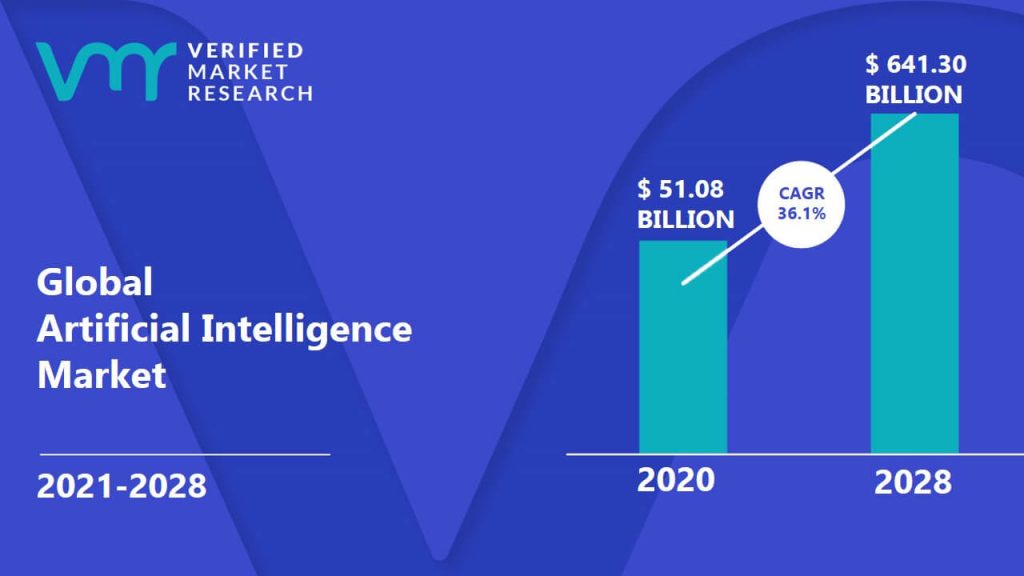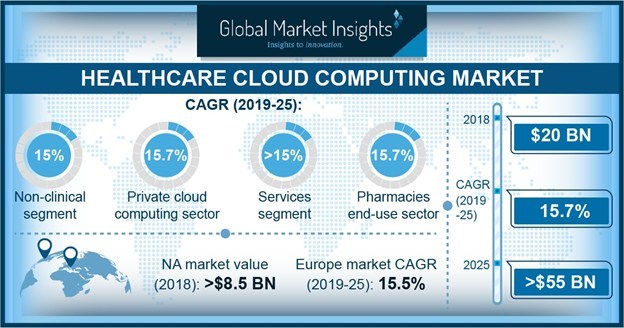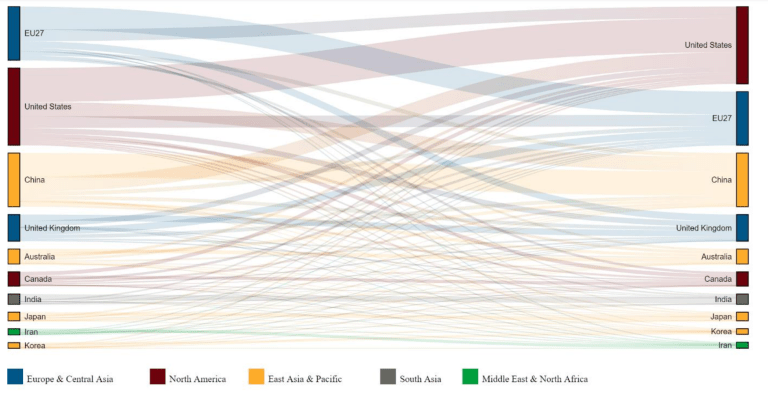
by Anika D | Jul 5, 2022 | Artificial Intelligence
Artificial intelligence is the core of the metaverse, revolutionizing businesses and other sectors with a new world. As a result, the global metaverse market is projected to grow from $100.27 billion in 2022 to $1,527.55 billion by 2029, which is a whopping number. In addition, there are some projects in line which will transform the foundation of trade. So, let’s look at how artificial intelligence and metaverse hope to achieve a true vision.
How can AI and Metaverse Build a Truly Digital World?

Source
There’s been a great metaverse development in the past few years, mainly in the gaming sector. Although gaming is performed in the same scenario, blockchain technology, like NFTs, etc., is a new addition. But, to achieve the ultimate metaverse, AI needs international cooperation and adaptation to a new level.
Many tech tycoons like Mark Zuckerberg believe these platforms are less AI-oriented and thus fail to work fully. Instead, a true metaverse world where you can trade, talk and indulge in social, commercial, and artistic things is the goal.
How to Overcome This Hurdle?
You will be surprised to know that more than a hundred companies are currently working on building their metaverse. In addition, it’s powered by AI and has huge flexibility, complexity, and much more.
As a result, you will have various options to choose from in an AI-powered metaverse. That includes building, conversing, playing music, making art, and buying and selling can turn a metaverse into an integral part of everyone’s lives. With various metaverse developments which are AI-driven and have strong blockchain technology, by 2026, 26% of people will be using metaverse daily.
Achieving the Vision
AI is kickstarting the growth of startups with its application in various business proceedings. Also, it will help to build a world that is exceptional and comprises all the actions you do in the real world. The powerful technology will alter neural nets (the processing force behind AI), related technology, and neural-symbolic AI (AI technology with state-of-the-art understanding abilities). Further, It will help to develop customized designs for individual users.
For example, you just have to explain a few scenarios, and an AI with a multiverse will present the same environment. In addition, it will have the VR experience and let you work in a completely virtual world.
You can use it for trading, fun, gaming, watching fashion shows, and much more. As AI technologies are properly deploying, they will unlock the real prospect of the metaverse. As a result, you will see the outcome of compelling digital landscapes that operate alongside the analog world.
Wrapping Up
This was the answer to how artificial intelligence and metaverse hope to achieve a true vision. For the metaverse to easily become extensive, smart, and functional, AI is important. With constant patterns and behavior, it will develop a world that will benefit all sectors. Surprisingly, it will range from students to business to international trading. AI, blockchain, and metaverse can ease many geographical barriers and create a truly digital world in the coming five or six years.

by Anika D | May 3, 2022 | Emerging Technology
The healthcare industry is rapidly using cloud computing in its daily operations. Furthermore, during the Covid-19 pandemic, the healthcare system depended totally on technology and cloud computing applications. As a result, along with medical staff, every medical institute has reaped the benefits of IT infrastructures.
Some main benefits of using cloud systems include improved privacy, better patient care, and lower expenses through remote operation. In addition, cloud computing implementation in the healthcare industry brought some new ways to boost the functionality of IT. As a result, cloud computing is becoming popular, and its market is forecast to reach above $70,000 million by 2027.

The worldwide Healthcare Cloud Computing Market is set to achieve over 15 percent CAGR up to 2025, owing to the growing adoption of cloud computing software by healthcare professionals.
Source
The following are some main benefits of implementing the cloud computing technology in the healthcare industry:
Affordable Solution to Store Healthcare Data
Healthcare service providers create a large amount of digital data each year. It includes lab tests, EMRs, insurance claims, and prescriptions. Cloud technology allows you to handle the data efficiently. In addition, when cloud computing provides storage, cloud-based analytical tools store more data and change it into useful information.
Improve Interaction Among Patients and Clinics
This technology allows medical staff and doctors to give patients high-quality services. They can obtain tests and results online, track treatment offered, and receive notifications of the latest updates. In addition, it provides a new level of safety and avoids overprescribing patients by accessing their medical records.
Receive Cost Benefits
It makes payment monitoring easier for healthcare providers. Moreover, you don’t have to invest in expensive infrastructure. By customizing a strategy, selecting a cloud solution can be cost-effective compared to setting up physical systems.
Ensure a Patient-Centric Approach

Source
Personalized medicine is a perfect example of a patient-centric approach. Cloud computing and data analysis in the healthcare industry allows making sense of clinical trials’ data to find out the best treatment for patients. In oncology, various specialists and clinical teams work collectively to ensure a well-coordinated treatment plan.
Reliability and Security
Data security is the most common reason behind the hesitation of medical institutes in selecting a cloud computing solution. It is natural to be scared of technology that one does not know completely. Therefore, this blog will familiarize you with cloud computing implications in the healthcare industry.
Suppose a doctor at the hospital uses a laptop to access the patient’s medical records. Unfortunately, if a computer gets stolen or lost, the data can land in the hands of the wrong people and harm the hospital’s reputation. If staff connect such devices to cloud servers, you can save your data and the hospital’s reputation.
Ease of Interoperability with Cloud Computing
Interoperability establishes data integrations in the healthcare industry, irrespective of storage or point of origin. Thus, interoperability fuels cloud adoption and make patient data readily available to gain insights to facilitate healthcare strategy. It helps healthcare providers easily access patients’ data collated from different resources and share it with stakeholders. Then, you can provide timely treatments.
It removes the distance between specialists that allow them to review files and cases and provide their opinions. In addition, having patient information on the cloud promotes interoperability among healthcare, insurance, pharmaceutical, and payments sectors.
Final Words
Cloud computing still has to go a long way in the healthcare industry. But with several benefits, there is no reason not to consider it seriously. Finally, the healthcare industry has already adopted technology, so it is time to attune it to changing IT infrastructure.

by Anika D | Apr 28, 2022 | Business, Emerging Technology
Technology has been transforming the auto industry over the last couple of years. New business plans, improved automation, and growth in new technologies are making significant changes in the automotive industry in 2022. In addition, remember to change consumer preferences and sustainability policies. So, what future technologies will come in handy in the auto industry? Let us see below.
What Are the Future Technologies in Automotive Industry?
Here are some future technology trends in the automotive industry:
Increased Manufacturing of Electric Cars
Automakers integrate modern car technology into their vehicles. Also, tech companies such as Tesla and Google are working on self-driving and electric automobiles. Therefore, it is clear that automobiles produced in 2022 will be full of technology addressing digital touchpoints. There is tough competition to create software and digital operating systems to control and power innovative electric vehicles.
Online Car Buying

Source
Technology boosts digitalization, resulting in consumers getting everything at their doorstep. The auto industry is also following this trend. The entire car buying process occurs digitally, from online paperwork completion and virtual test drives to delivering a vehicle at your doorstep.
Some auto dealerships follow a hybrid model. In this, you can manage some aspects like test drives and paperwork online, but you have to visit a showroom to collect the ordered vehicle.
Wireless Technology
The normal car has above 100 million codes and 30,000 parts. With advanced technology, these numbers have risen more. Particularly, modern car technology will use more data to navigate properly. In addition, 5G will take navigation to another level in 2022.
For instance, two smart cars on the road can exchange information, including traffic movement, weather patterns, road conditions, etc. In the coming time, you can exchange these things instantly with the help of 5G technology.
Autopilot Cars
Fully automated self-driven cars only exist in science fiction. But technology has made the commercial availability of advanced driver-assistance systems (ADAS) and semi-autonomous cars. However, ADAS in the market revealed some challenges for autonomous vehicles market penetration. Pricing, safety issues, consumer understanding, and insufficient regulatory base are among them.
Modern car technology trends like artificial intelligence, machine learning, and neural networks make the manufacturing of autonomous vehicles possible. They need no human intervention, even in complicated traffic situations. It leads to the growth of new application scenarios.
Automotive Cybersecurity
Technology has made automotive cybersecurity possible. It means digital systems protection inside the vehicle prevents thieves from gaining unauthorized access and taking control of the car. Advanced automobile cybersecurity will deter criminals from data-stealing, vehicle-manipulating, or causing physical damage.
Personalization
Personalization drives vehicle marketing and product customization for customers. For the automobile industry, product customization has a great potential to make the usage of cars safe and enjoyable.
For instance, advanced applications will collect or analyze data on driver’s behavior. It will also determine patterns like regular visits to cafes, gas stations, or grocery stores. Then, it will monitor the technical conditions of a vehicle and notify a driver if a particular part needs replacement.
Final Thoughts
The recent trends in the auto industry and consumer behavior changes will fasten the development of self-driven cars. Also, they will inspire companies to restrategize and bet on technologies for the coming future.

by Anika D | Feb 21, 2022 | Emerging Technology
When we think of quantum computing, we generally relate this to the universe. But there is much more behind this ultra-advance technology. In this blog, we’re going to learn what is quantum computing and its applications.
What is Quantum Computing?
Quantum computing is a discipline of computing that relates to building computer technology according to quantum theory. This theory explains the behavior of energy and material on both atomic and subatomic levels. In contrast, quantum computing uses qubits, also known as quantum bits.
Quantum computer was invested in 1998 by three professionals:
- Isaac Chuang – Los Alamos National Laboratory
- Neil Gershenfeld – Massachusetts Institute of Technology (MIT)
- Mark Kubinec – University of California at Berkeley
They created the first quantum computer (2-qubit). This computer could be loaded with data and results in a solution.
Applications or Uses of Quantum Computing

Quantum computing is well-suited for solving many complex problems. These are the problems that even supercomputers cannot solve. That’s when a quantum computer makes things easier.
The top applications of quantum computing are:
- Cybersecurity: Quantum computing can help develop various advanced technologies to combat prevalent cybersecurity threats. It helps form advanced encryption methods, also known as quantum cryptography.
- Drug Development: The trial and error method of developing drugs is expensive and risky. Quantum computing can make it easy to understand how particular drugs react to humans. So, it saves a lot of money and time for drugs manufacturers.
- Financial Modeling: Quantum technology can perform massive and complex calculations, making date computations faster and more efficient.
- Weather Forecasting and Climate Change: Weather forecasting includes complex variables such as air pressure, air density, and temperature. Quantum machine learning can improve pattern recognition, making it easier and faster for scientists to forecast extreme and devastating weather events. It will also make meteorologists generate detailed climate models. So, it will be very helpful in combating climate change.
In addition to these, quantum computing can be very helpful in the following (not limited to) areas:
- Better Batteries
- Cleaner Fertilization
- Traffic Optimization
- Artificial Intelligence
- Solar Capture
- Electronic Materials Discovery
Moreover, the field demands more intensive research to determine how it can solve complex and unsolved issues in these areas.
What is the Future of Quantum Computing?
The shortest answer is the future of quantum computing is very bright. It could solve a lot of complex challenges that quantum physicists face. Moreover, it is expected to change our basic understanding of reality and may become a reality very soon.

by Anika D | Feb 16, 2022 | Artificial Intelligence, Machine Learning
Various competitive pressures boost the AI companies in making suitable investments to have safe and reliable systems. Companies need to prevent and solve action problems to ensure the responsible development of technology and AI systems. There are various factors that improve the cooperation prospects in action problems.

Source
When it comes to innovation, research, and standardization, the AI landscape is synergetic. There are many reasons to sustain and enhance cooperation. Some of them are listed below:
AI Development is Resource-Intensive
Cooperation between government and AI researchers and implementing teams across the globe can maximize the scale advantage. The absence of international cooperation leads to duplicative and competitive investments in AI capacity. As a result, it creates unnecessary costs and leaves the government deprived of AI outcomes. Various inputs used in the AI development, like high-quality data access, large-scale computing knowledge benefit from scale.
- International cooperation based on democratic principles can help to focus on building trust and responsible AI development.
Though much progress is made on AI, there are differences between FCAI participants.
AI governance needs to interpret the AI principles to policy, standards, and regulatory frameworks. These need a deep understanding of AI in practice or working through the operation of principles in certain contexts. Also, in the face of unavoidable trade-offs.
- For regulation, divergent approaches create barriers to diffusion and innovation.
Government initiatives to inspire domestic AI development across digital sovereignty concepts can have cynical spillovers. For instance, restrictions on data access, discriminatory investment, data localization, and other requirements.
Similarly diverging risk categorization regimes and governing requirements can boost the costs for seeking businesses to serve the AI market globally. Varying AI regulations can necessitate variations of AI structures that can improve the work important to develop AI systems. It leads to high compliance costs that affect small firms.
Regulating AI Enables Organizations in AI Development
Companies produce business by creating expertise in AI systems, then licensing these to other companies. As AI gets global, a complex assembly of AI systems emerges in various sectors.

Source
The more open international market will enable a company to make benefit from digital supply chains. Moreover, boosting international competition by specialized firms will inspire more AI innovation and healthier markets.
- Enhanced trade cooperation is vital to prevent unjustified restrictions of flowing data and goods.
It substantially minimizes the prospective gains of AI Diffusion. The strategic importance of sovereignty and data has given a boost to legitimate industrial policy actions directed at mapping. But, protectionist actions can jeopardize international cooperation and impact consumer choice.
- Cooperation between like-minded countries is essential to assert the main principles of openness and democracy protection.
The risks linked with the corrupt use of AI systems by techno authorities expose citizens to potential human rights violations. It also intimidates them to split cyberspace into incompatible technology heaps and fragment the international AI development process.
Final Words
International cooperation is important for most governments. So, AI strategies show that governments respect the connection between AI development and collaboration around borders.











